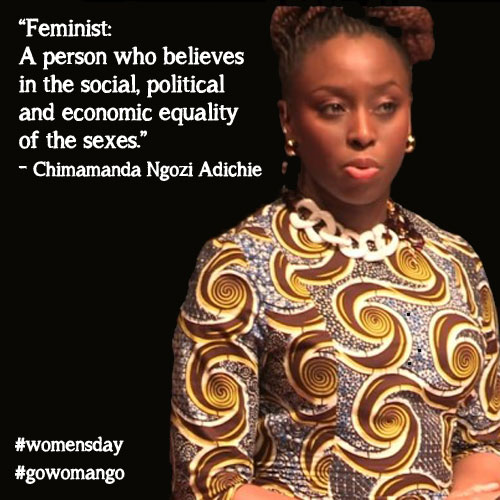In politics, every discourse turns around how manly one ought to be, and even in religion, it is still to men’s advantage. Regularly, it amounts up to the same tune: men don’t cook, men don’t wash clothes, men don’t do this, men don’t do that, and rarely about what is denied to women. Surprisingly, when the youths are fighting for their inclusion, they table what the society excludes them from. When a tribe is being marginalized, the population is quick to forward their grievances, and when a political party is outsmarted, it comes up with the faults of the other party. These are, normally, how revindications and social injustice are addressed in our society.
Yet, with feminism, no one cares about the constant mansplaining, the mischievous religious innuendos, and the flagrant denial of the necessity to redress the social disequilibrium in man-woman discourses of our society. People talk about socially constructed differences as if they are biological. Every decade, we develop some efficient mechanisms to turn sociological narratives into metaphysical truths. A few days back, a lady refused to receive a proposal ring, because the boy refused to kneel while making the marriage proposal. And all the social media bots were ready to bury her alive; calling her all sorts of names. Funny enough, in our culture, a woman kneels to offer her husband wine during the marriage. Yet, no one questions that. But, come to think of it! Why should a woman kneel before a man, in the first place? And even if a young boy of 18 years ever marries a woman of 50 years old in our culture, she will be expected to kneel to offer him wine during our traditional marriage ceremony. So, why should an older woman kneel before a young boy? Is it because he possesses more testosterone or because she is the only one capable of being pregnant?
A few days back, a lady refused to receive a proposal ring, because the boy refused to kneel while making the marriage proposal. And all the social media bots were ready to bury her alive; calling her all sorts of names. Funny enough, in our culture, a woman kneels to offer her husband wine during the marriage. Yet, no one questions that. But, come to think of it! Why should a woman kneel before a man, in the first place? And even if a young boy of 18 years ever marries a woman of 50 years old in our culture, she will be expected to kneel to offer him wine during our traditional marriage ceremony. So, why should an older woman kneel before a young boy? Is it because he possesses more testosterone or because she is the only one capable of being pregnant?
If we are all scandalized to see some races lord it over others, why on earth should we tolerate it when one gender dominates the other? If equality exists between men, why should that be different in relationships with women? And why, even in this 21st century, should we believe that our society, with all its flaws, is the only sane one whose ethos has to be preserved for thy kingdom come?
I know that many will use religion to defend this injustice. Yet, I’m aware that they know quite well that historic context is vital to the comprehension of every religious text. But unfortunately, we are trained to mansplain every reality to suit our socially constructed narratives.
I know that many will use religion to defend this injustice. Yet, I’m aware that they know quite well that historic context is vital to the comprehension of every religious text. But unfortunately, we are trained to mansplain every reality to suit our socially constructed narratives.
And even though I do not wish to determine what men or women should or shouldn’t do, I believe that there is no way one can justify gender discrimination and condemn racism. If equality of right is befitting to whites, blacks, reds and yellow, equal right is not bad for both men and women. As Elizabeth Cady Stanton would say it in “The Complete History of Women’s Suffrage”:
“In right conditions, the interests of man and woman are essentially one; but in false conditions, they must ever be opposed. The principle of equality of rights underlies all human sentiments, and its assertion by any individual or class must rouse antagonism unless conceded.” (Elizabeth Cady Stanton et al., 2017)





